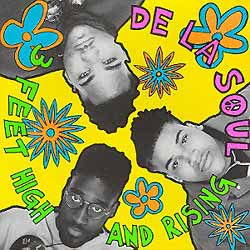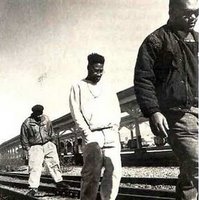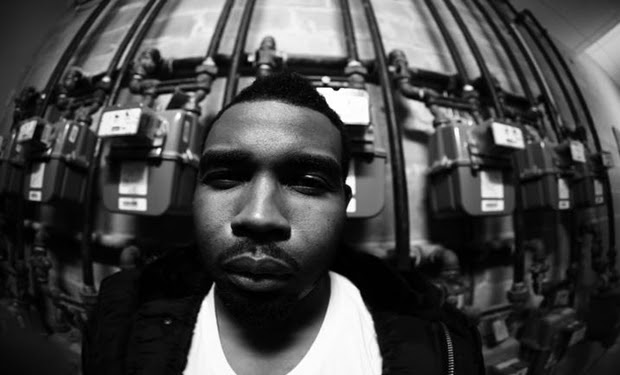
By shelz.
When a creative mind wanders, it rarely finds itself immersed in process and procedure. Structure means very little to artists except acting as an unwelcomed boundary confining their creation to the expectations of others. However, operating within certain parameters tends to be the nature of the music business beast. If you want to continue to create, you have to live by the rules, which at times will be in opposition to your artistic inclination. These are the breaks.
There have been artists however, who through either rebellion or inexperience have managed to create a masterpiece by ignoring the rules. Some of these projects have been so game changing that they have actually established a set of new ones. 3 Feet High and Rising is one of those masterpieces.
It was a brilliantly amusing, upbeat and quirky album that sounded like absolutely nothing Hip-Hop had heard before. And its legacy was almost immediate. It produced an alternate lane, a fork in the rap road that plenty of trailing artists have taken. It would have been a ballsy move from a trio of rap neophytes whose personas ran afield of the typical Hip-Hop guise if they actually knew what they were doing. But they didn’t. They had no idea as they worked and played and laughed in that studio over 20 years ago that what they were producing was going to change the musical landscape forever.
Prince Paul, Daddy-O‘s production understudy with Stetsasonic, was tapped to helm the production On 3 Feet High.. after he bettered the track construction of the groups first single, “Plug Tunin,” and the rest is Hip-Hop history. While sampling was far from a new technique in late 80’s rap, he managed to elevate it to an art form with this album. It was a convergence of hundreds of divergent elements, a sonic quilt containing stitches from tons of artists representing every genus imaginable. From Liberace to The Turtles to Johnny Cash; no one with a well crafted piece of music was safe. And the lyricism was just as eclectic and ground breaking.
 The concepts shifted the genre from profanity laden street anthems to that of positivity. Even on the most somber of album cuts, “Ghetto Thang” and “Say No Go,” Pos, Mase and Trugoy managed to insert a silver lining. But the bulk of the album is sex, silliness and fun with a tinge of hubris. It’s a trip through the average adolescent boy’s schizophrenic brain, just with a superior and relatively curse-free soundtrack.
The concepts shifted the genre from profanity laden street anthems to that of positivity. Even on the most somber of album cuts, “Ghetto Thang” and “Say No Go,” Pos, Mase and Trugoy managed to insert a silver lining. But the bulk of the album is sex, silliness and fun with a tinge of hubris. It’s a trip through the average adolescent boy’s schizophrenic brain, just with a superior and relatively curse-free soundtrack.
De La takes you from 11 am story time in kindergarten class (Tread Water) to a head scratcher of a spoken word piece that can only be described as a space trip to Mars with a layover in France (Transmitting Live from Mars). There is a love song (Eye Know) and an over the top call and response piece that could have easily made every club DJ wax nostalgic on some of the silly stuff they shouted over the mic in their past (Do As De La Does.) They recorded the predecessor to the “The Whisper Song” (I Have a Secret), addressed the biters (Potholes In My Lawn) and even delivered an ode to washing your ass properly (A Little Bit of Soap). Then there was the sexual content, but even that was a free-thinking romp into scattered topics.
The group discussed losing their virginity to the high school garden tool in “Jenifa Taught Me.” They amped the level of maturity with the posse cut “Buddy” that featured The Jungle Brothers and Q-Tip and there was a full frontal phonic orgy (De La Orgee). But even that was so exaggerated it became giggle inducing.
The group was panned by some critics for being too juvenile, perhaps too upbeat. The unwritten law that Hip-Hop music had to be tales of urban blight, criminality and woe-filled stories of economic exclusion was starting to take shape at that time. But De La Soul didn’t follow the law, they were above it.
So as we look back over the twenty years that have elapsed in Hip-Hop since the release of that album we can see the legacy unfold. De La Soul has been credited with laying the foundation of the sub-genres jazz rap and alternative rap (for those who like to classify things.) Practically every music publication that acknowledges Hip Hop has listed the album on their top albums of all time list. Even the process of sample clearance was updated due to some of the more obscure pieces the crew used (and Tommy Boy neglected to clear.) De La Soul trusted and invested completely in themselves and proved that following the sheepish path to the nearest fad does not always benefit an artist. And most importantly, they proved that some rules are just meant to be broken even if they didn’t know they were doing it.
Follow Us on Twitter @ http://twitter.com/planetill
Follow shelz. on Twitter @ http://twitter.com/shelzp
Join Us on the Planet Ill Facebook Group for more discussion



